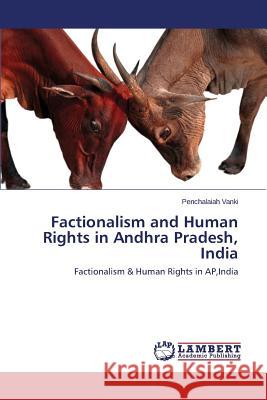Factionalism and Human Rights in Andhra Pradesh, India » książka
Factionalism and Human Rights in Andhra Pradesh, India
ISBN-13: 9783659473623 / Angielski / Miękka / 2014 / 232 str.
Rayalaseema region is one of the backward regions of Andhra Pradesh, India, with poor resources and low socio-economic conditions. Factionalism and human rights are natural enemies with no possibility of their co-existence. No person who supports human rights can support factionalism, which results in a grave violation of human rights of innocent citizens. Political conflicts and factionalism in the Rayalaseema region of Andhra Pradesh are common social phenomena. The followers and victims of factionalism and members of families of factional politics are often denied their basic human rights. The present book delineates socio-economic profiles of the victims of the factionalism, violation of their human rights, causes of factionalism, and suggestions to combat and eliminate the social problem of the factionalism. Salient judgments of Indian courts on factionalism and sections read with while disposing the factional cases are highlighted. Strategies to improve the socio-economic conditions of victims of factionalism and to enjoy their rights are proposed. Implications of the study are discussed.
Rayalaseema region is one of the backward regions of Andhra Pradesh, India, with poor resources and low socio-economic conditions. Factionalism and human rights are natural enemies with no possibility of their co-existence. No person who supports human rights can support factionalism, which results in a grave violation of human rights of innocent citizens. Political conflicts and factionalism in the Rayalaseema region of Andhra Pradesh are common social phenomena. The followers and victims of factionalism and members of families of factional politics are often denied their basic human rights. The present book delineates socio-economic profiles of the victims of the factionalism, violation of their human rights, causes of factionalism, and suggestions to combat and eliminate the social problem of the factionalism. Salient judgments of Indian courts on factionalism and sections read with while disposing the factional cases are highlighted. Strategies to improve the socio-economic conditions of victims of factionalism and to enjoy their rights are proposed. Implications of the study are discussed.











